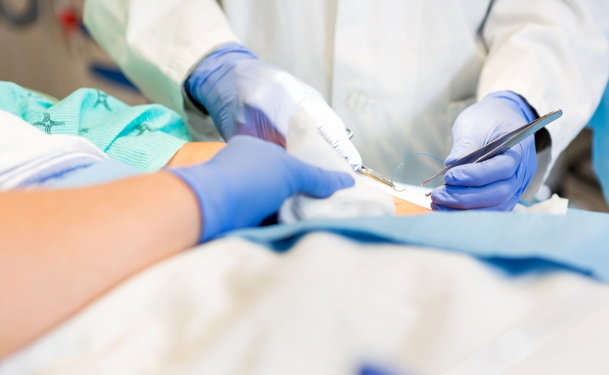As the name implies, nonhealing surgical wounds are wounds from surgical procedures which have not undergone the normal process of healing. As with other types of nonhealing wounds, the three phases of wound healing (the inflammatory, proliferative and remodeling phases) have been prolonged or did not progress in an orderly fashion.
Causes of Nohealing Surgical Wounds
There are many causes of nonhealing surgical wounds. However, probably the most common cause is wound infection. Wound infections of this type are known as surgical site infections (SSIs), which are estimated to account for 14 to 16 percent of all hospital-acquired infections in the United States. Surgical site infections are believed to cause a majority of deaths involving patients who have undergone surgery. Most infections of surgical sites are caused by bacteria from the skin, but can come from other parts of the body as well. The presence of other medical conditions that can cause decreased immune function, such as diabetes, can complicate wound healing and cause nonhealing surgical wounds.
Who is at Risk
The type of surgery is one risk factor for the development of nonhealing surgical wounds. Operations involving the intestines have a higher rate of SSIs because of the vast amounts of bacteria present there. Aside from that, a poor surgical technique contributes to the rate of infection. Like in any type of wound, patients with poor nutritional status and diabetics have an increased risk for this condition.
Signs and Symptoms
There is no specific cut-off time to determine whether a wound is nonhealing or not. However, most wounds heal in a matter of weeks and achieve 70 percent of their strength in around four months. Follow-up visits with your surgeon are an important component of treatment and will let you know whether your wound is healing properly.
Treatment Options for Nonhealing Wounds
Nonhealing surgical wounds are treated the same way as other nonhealing wounds. The patient's medical condition which underlies or contributes to poor wound healing should be addressed and controlled sufficiently. Antibiotics, whether topical, oral, or intravenous, may be given to eradicate any bacterial infection and promote healing. Prophylactic antibiotics, which are antibiotics given prior to the surgery to prevent potential infections, may be given for operations with a high risk for infection. These include bowel surgeries and surgeries which last for long periods of time.
Proper wound care is an important factor in the treatment of nonhealing surgical wounds and should be performed religiously. Debridement (cleaning of the wound to remove any debris) should be performed, if necessary, to promote wound healing. The use of vacuum-assisted wound closure has been studied and found to reduce the wound healing time and the length of hospital stay.


